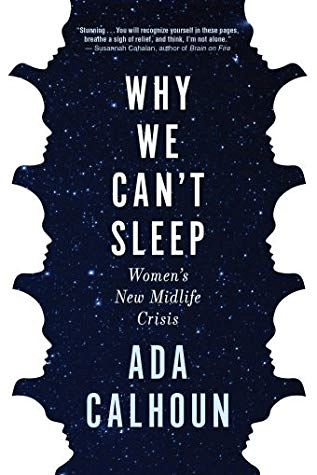 Why We Can't Sleep: Women's New Midlife Crisis by Ada Calhoun
Why We Can't Sleep: Women's New Midlife Crisis by Ada Calhoun Narrator: Ada Calhoun
Published by Audible Studios on January 7, 2020
Source: Purchased
Genres: Non-fiction, Feminism
Length: 5 hrs 43 mins
Pages: 288
Format: Audiobook
Purchase at Bookshop.org or Purchase at Amazon
Add on Goodreads

When Ada Calhoun found herself in the throes of a midlife crisis, she thought that she had no right to complain. She was married with children and a good career. So why did she feel miserable? And why did it seem that other Generation X women were miserable, too?
Calhoun decided to find some answers. She looked into housing costs, HR trends, credit card debt averages, and divorce data. At every turn, she saw a pattern: sandwiched between the Boomers and the Millennials, Gen X women were facing new problems as they entered middle age, problems that were being largely overlooked.
Speaking with women across America about their experiences as the generation raised to “have it all,” Calhoun found that most were exhausted, terrified about money, under-employed, and overwhelmed. Instead of being heard, they were told instead to lean in, take “me-time,” or make a chore chart to get their lives and homes in order.
In Why We Can’t Sleep, Calhoun opens up the cultural and political contexts of Gen X’s predicament and offers solutions for how to pull oneself out of the abyss—and keep the next generation of women from falling in. The result is reassuring, empowering, and essential reading for all middle-aged women, and anyone who hopes to understand them.
This summer was the first time someone referred to me as “middle-aged.” I’ll be honest, it threw me for a bit of a loop. Usually, people tend to think I’m younger than I am, but this person has known me since I was a kid and knows exactly how old I am. He’s also not the most tactful of people. Apparently, Gen X-ers are hitting middle-age.
Why We Can’t Sleep is for and about us – middle-class Generation X women in America. Calhoun has done a lot of research, historical and social, and spent a lot of time interviewing women from across the country. If you’re one of us, at least parts of the book will strike a chord. She talks about watching the Challenger explosion at school, about Oregon Trail, about being new to the workforce during the early-2000s recession and about buying our houses right before the housing crisis. She looked into housing costs, HR trends, credit card debt averages, and divorce data. We were taught we can have it all, but having it all is tough. Caring about everything is tough. One in four middle-aged American women is on antidepressants. Nearly 60% of those born between 1965 and 1979 described themselves as stressed.
I’m pretty happy and not overly stressed. But we had our daughter earlier than a lot of our generation, which means I don’t have the stress of small children and carting them around to school, classes, etc. She just turned 20, while my brother’s twins are not yet 3, and he’s only about 3 years younger than me. My mother, while over 65, still works, lives in her own house and requires little from us except the occasional furniture moving, so I’m not currently a caregiver of anyone except our dog. I’m not part of the sandwich generation, but I do relate to many women in the book in other ways.
But it’s not all doom and gloom. Happiness really is relative and we have to fight for what happiness feels like by our own definition, not by what society claims will make us happy. Calhoun offers strategies for dealing with such varied things as pre-menopause, divorce, being single with children, being single and childless, work-related stress, and reconciling the dreams you had for yourself with the reality you are now experiencing.
There’s even a fun little Mid-Life Crisis Mix Tape Playlist at the end.

The mid 40’s are tough for starting to see yourself in a different stage of life. It’s not bad, but it is a little bit of a struggle. I got a little freaked out when I realized that after my birthday this year I’d be going on 50. Yikes.